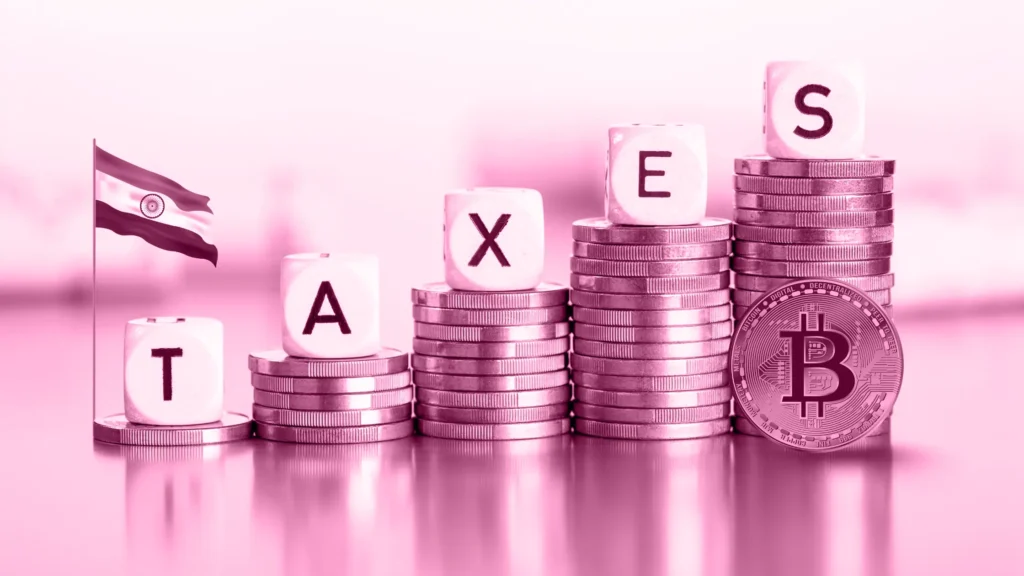The year 2025 has become a turning point for India’s cryptocurrency community. The Income Tax Department has sent out over 44,000 tax notices in August alone, and investors nationwide are realizing – cryptocurrency taxation in India is no longer in the shadows— it is a real situation and one that can financially devastate the unaware. Let’s brust some crypto myths.
Even with the clearly established and enforced 30% flat tax rate in 2022, and the mandated 1% TDS, a deadly batter of myths still exist among Indian crypto investors. It is not just an exercise in wrong assumptions, misconceptions are financial landmines that have destroyed the portfolios of thousands of traders who thought they would be able to game the system.
From the busy tech streets of Bangalore to the trading floors of Mumbai, stories come in daily, investors receiving heartbreaking tax notices, paying penalties, in lakh, and watching their crypto details turn into compliance nightmares. The tax regulators such as the Income Tax Department have the latest data analytics and AI-powered systems in place making tax evasion virtually impossible, yet crypto myths still remain.
The Explosive Reality Behind India’s Crypto Tax Enforcement
India’s method of regulating tax on cryptocurrency is one of the most strict in the world, utilizing advanced technology, including artificial intelligence and other forms of data analytics, to monitor even small transactions. As a result, significant amounts of tax revenue generated in the crypto sector, ₹437 crore, alongside enforcement words that have covered practically everything§.
The Income Tax Department’s “NUDGE” campaign is the last word of non-compliant traders, following a systematic plan to review data from exchanges, TDS returns, and overseas transactions. For those who have not complied with their tax obligations, the department’s message is simple: voluntary compliance now or face full force of the law later.
#1: “Trading on International Exchanges Makes You Tax-Free” – The ₹12 Lakh Reality Check
- The Devastating Truth: This myth has likely wasted more Indian investor dollars than any crash. The notion that one has escaped tax on Binance, Bybit, or external platforms is not just incorrect – it is financial suicide.
- Real Expert Insight: CA Suresh Surana, whose clients have received tax notices, explains: “The Income Tax Department has access to information about undisclosed crypto income even if transactions didn’t go through Indian exchanges. We’ve seen cases where hardware wallets were seized during raids.”
- The Reality: Your tax obligations will depend on where you live, not the platform on which you are trading. If you are an Indian resident, you are liable for tax in India on your crypto profits located globally. The department has respiratory tracking technologies that can easily capture individuals involved in high-frequency trading, arbitrage, or arbitrage trading on markets outside of India.
- Expert Warning: It is dangerous to believe that foreign exchanges do not report to Indian authorities. The Income Tax Department can track what you do through international cooperation agreements, as well as data from blockchain and other technologies.
#2: “Crypto-to-Crypto Swaps Aren’t Taxable Events” – The Hidden Tax Bomb
- The Shocking Truth: Every crypto-to-crypto trade you make—including changing out Bitcoin for Ethereum, or any combinations of altcoins—results in a taxable event under Indian law. This rumor has surprised tons of active traders.
- Technical Breakdown: When you swap BTC for ETH, the Income Tax Department technically sees this as two transactions: you sold or disposed of your Bitcoin and then bought Ethereum. Thus, you will owe taxes on your Bitcoin disposal — a 30% tax on any gains you made on that disposal.
- Real-World Catastrophe: Now consider Rahul, he is an active DeFi trader and in 2023-24 he made over 200 crypto-to-crypto swaps, thinking he only owed taxes on fiat conversions. His tax liability was over ₹8 lakhs, while he had only ₹1 lakh in his bank Account.
- The Compliance Nightmare: Each swap requires full calculation of gains/losses at fair market value on the transaction date, and then converted to INR. For a frequent trader, this is perhaps thousands of individual tax computations.
#3: “I Can Carry Forward My Crypto Losses” – The No-Recovery Zone
- The Brutal Reality: Unlike traditional investments where losses can offset gains, crypto losses under Section 115BBH cannot be set off against any other income or carried forward to future years. This creates a devastating “heads I win, tails you lose” scenario for the government.
- The Mathematical Tragedy: If you lose ₹10 lakhs in crypto this year, and make profit of ₹5 lakhs next year, you will be taxed at 30% of the ₹5 lakhs of profit (around ₹1.56 lakhs), while your previous loss of ₹10 lakhs has vanished.
- Expert Commentary: The tax treatment is more punitive of crypto as an investment than even winnings at a casino or a lottery win. CA Mitesh from MN Partners notes: “This creates severe cash flow problems for traders who might have paper profits but face real tax liabilities.”
- Strategic Disaster: This rule has forced many sophisticated investors to completely restructure their portfolios, moving away from crypto trading to traditional investments where loss set-offs are allowed.
- Important Exception: Only losses from crypto derivatives and futures can be carried forward, but only if you file your taxes before the deadline. This narrow exception has provided relief to some institutional traders.
#4: “No TDS Means No Tax Liability” – The Silent Audit Trigger
- The Dangerous Assumption: Many investors believe that if their Form 26AS doesn’t show crypto-related TDS entries, they have no reportable crypto income. This myth has triggered some of the most expensive tax notices in 2025.
- The Hidden Tracking System: The Income Tax Department doesn’t rely solely on TDS reporting. They use:
- Exchange transaction reports
- Bank statement analysis
- International data sharing agreements
- Blockchain analytics tools
- AI-powered pattern recognition
- Real Notice Example: KoinX reports numerous cases where traders received notices despite no TDS appearing in Form 26AS, particularly those using P2P platforms or international exchanges.
- Expert Warning: CA Ravi Sawana from Lakshmikumaran & Sridharan explains that these notices often state: “Transactions in cryptocurrencies on which tax has been deducted under Section 194S have not been declared in the income-tax return, even though many cases involve transactions where no TDS was actually deducted.”
- The Compliance Trap: The department’s expectation is clear—report all crypto income regardless of TDS status. Failure to do so results in automatic notice generation and potential penalties.
#5: “I Can File My Taxes Late Without Consequences” – The Penalty Multiplier
The Expensive Reality: This seemingly harmless procrastination can trigger a cascade of financial disasters that multiply your tax burden exponentially.
Penalty Structure Breakdown:
- Late filing penalties: Up to ₹5,000
- Interest on unpaid taxes: 1% per month
- Penalty under Section 270A: 50% of tax payable for underreporting
- Section 271AAC penalty: 200% for misreporting
Case Study Impact: An investor with ₹2 lakh in crypto gains who files six months late could face:
- Original tax: ₹62,400 (30% + cess)
- Interest: ₹3,744 (6 months at 1%)
- Late filing penalty: ₹5,000
- Total cost: ₹71,144 vs. original ₹62,400
Expert Strategy: CA Suresh Surana emphasizes that filing within deadlines is crucial: “Even if you discover errors later, filing on time allows you to use the updated return provisions under Section 139(8A) without additional late filing consequences.”
Strategic Advantage: Timely filing also enables loss carry-forward for crypto derivatives, a benefit that disappears with late filing.
#6: “Airdrops and Staking Rewards Are Tax-Free Income” – The Hidden Income Trap
Every airdrop, staking reward, hard fork, and mining reward constitutes taxable income at your applicable slab rates when received, followed by 30% tax on subsequent disposal.
Double Taxation Nightmare: Consider receiving ₹50,000 worth of airdropped tokens:
- Receipt: Taxed as “Income from Other Sources” at your slab rate (up to 30%)
- Sale: Any gains taxed again at 30% under Section 115BBH
Staking Complexity: Regular staking rewards create monthly taxable events requiring meticulous record-keeping. Each reward must be valued in INR on the receipt date for tax calculation.
Expert Guidance: Crypto tax specialists recommend maintaining detailed logs of all airdrops and rewards, including:
- Date of receipt
- Fair market value in INR
- Source platform or protocol
- Subsequent disposal details
Compliance Challenge: Many investors discover their airdrop tax liabilities only during notices, often years after the events, resulting in substantial interest and penalty calculations.
#7: “Gifting Crypto Avoids Taxation” – The Gift Tax Misunderstanding
The Complex Reality: Crypto gifts create intricate tax scenarios that often result in unexpected liabilities for both givers and receivers.
Recipient Tax Burden: If you receive crypto as a gift exceeding ₹50,000 from non-relatives, it’s taxable as “Income from Other Sources” at your applicable slab rates. The subsequent sale triggers additional 30% tax on gains calculated from a zero cost basis.
Giver’s Hidden Liability: Transferring crypto as a gift triggers capital gains tax for the giver based on the fair market value at transfer date.
Family Exception Trap: While gifts between close relatives are exempt, the definition of “relative” is narrow and specific. Gifts between friends, distant relatives, or business associates are fully taxable.
Valuation Complexity: Determining fair market value for exotic tokens or NFTs at gift date creates significant compliance challenges.
#8: “I Only Need to Pay Tax When I Withdraw to Bank” – The Disposal Event Blindness
The Comprehensive Truth: Indian tax law recognizes multiple disposal events beyond bank withdrawals, each triggering immediate tax liability.
Complete Taxable Events List:
- Crypto-to-crypto trades
- NFT purchases using crypto
- DeFi protocol interactions
- Gaming platform transactions
- Peer-to-peer transfers
- Cross-border transfers
- Payment for goods/services
Real-World Example: An investor used Bitcoin to purchase an NFT worth ₹3 lakhs, having originally bought the Bitcoin for ₹1.5 lakhs. Despite no bank transaction, they owe 30% tax on ₹1.5 lakh profit (approximately ₹46,800).
Expert Analysis: This myth particularly affects DeFi enthusiasts who engage in complex transactions without realizing each step creates tax obligations.
Tracking Nightmare: Modern crypto investors might trigger dozens of taxable events monthly through automated protocols, yield farming, and liquidity provision activities.
#9: “Small Amounts Are Below Tax Department’s Radar” – The Micro-Transaction Tracking
The Surveillance Reality: The Income Tax Department’s AI-powered systems flag patterns regardless of individual transaction size. Small transactions often indicate larger unreported activities.
Technology Advantage: Advanced analytics can identify:
- Frequent small transactions suggesting trading activity
- Patterns consistent with tax avoidance strategies
- Accumulation strategies designed to stay below reporting thresholds
Case Example: A college student making ₹500-₹2,000 crypto trades received a tax notice when the accumulated annual profit exceeded ₹50,000, despite believing individual transactions were “too small to matter.”
Expert Warning: CA Gaurav Mehta from Catax explains: “The department’s systems are sophisticated enough to aggregate small transactions across multiple platforms to build comprehensive transaction profiles.”
Compliance Approach: Every transaction, regardless of size, should be properly recorded and reported to avoid systematic compliance failures.
#10: “Crypto Mining is a Tax-Free Business” – The Mining Revenue Miscalculation
The Business Reality: Cryptocurrency mining creates complex tax obligations encompassing both business income and capital gains scenarios.
Mining Income Categories:
- Mining Rewards: Taxable as business income at applicable slab rates when received
- Subsequent Sales: 30% tax under Section 115BBH on gains from cost basis (mining date value)
- Equipment Depreciation: Standard business depreciation rules apply
Professional vs. Casual Mining:
- Professional miners: Business income treatment with expense deductions allowed
- Casual miners: Income from other sources with limited deduction options
GST Implications: Mining services may also attract 18% GST on transaction fees and service charges.
Expert Guidance: Mining operations require sophisticated accounting systems to track:
- Daily mining rewards at fair market value
- Equipment costs and depreciation
- Electricity and operational expenses
- Subsequent disposal transactions
The Ultimate Guide to Crypto Tax Compliance: Expert Strategies That Actually Work
Immediate Action Items:
- Comprehensive Transaction Audit: Review all crypto activities from April 2022 onwards using professional tools like Catax.
- Updated Return Filing: If you’ve missed reporting crypto income, file ITR-U under Section 139(8A) within 24 months of the relevant assessment year.
- Documentation Systems: Implement robust record-keeping covering all exchanges, wallets, and transaction types.
- Professional Consultation: Engage qualified CAs specializing in crypto taxation for complex scenarios.
Advanced Compliance Strategies:
- Portfolio Restructuring: Consider Bitcoin ETFs and regulated investment vehicles that may offer more favorable tax treatment compared to direct crypto holdings.
- Tax-Efficient Timing: Plan disposals strategically to manage tax liabilities across financial years, though loss set-off restrictions limit optimization opportunities.
- International Compliance: For NRIs and international exposure, ensure proper FEMA compliance and foreign asset reporting under Schedule FA.
Why Leading Experts Recommend Catax for Foolproof Compliance
In an era where a single compliance error can cost lakhs in penalties, choosing the right tax calculation platform becomes critical for survival in India’s crypto landscape.
Catax stands out as India’s most trusted crypto tax solution for several compelling reasons:
- Technical Superiority: Catax integrates with over 100+ exchanges and wallets, automatically importing transaction data to ensure no trade goes unreported. Its advanced algorithms handle complex scenarios like DeFi interactions, NFT transactions, and cross-chain bridges that often confuse other platforms.
- Regulatory Expertise: Built specifically for Indian regulations, Catax understands the nuances of Section 115BBH, TDS requirements under Section 194S, and VDA reporting obligations. The platform generates reports that comply with Income Tax Department expectations and audit requirements.
- Expert Consultation: Beyond software, Catax provides access to qualified tax professionals who understand crypto taxation complexities. This human expertise becomes invaluable when facing tax notices or complex scenarios.
- Audit-Proof Reports: Catax generates comprehensive, detailed reports that satisfy Income Tax Department scrutiny, including transaction timelines, gain/loss calculations, and TDS reconciliation.
When You Need Expert Help: The Red Flags That Demand Professional Intervention
Immediate Professional Consultation Required:
- Received any Income Tax notice related to crypto transactions
- Trading across multiple international platforms
- Significant DeFi protocol interactions
- Mining or staking activities
- NFT trading or creation
- Annual crypto profits exceeding ₹10 lakhs
The stakes in crypto taxation have never been higher. With the Income Tax Department’s sophisticated tracking capabilities and severe penalties for non-compliance, the margin for error has virtually disappeared.
Your Financial Future Depends on Today’s Decisions
The crypto tax landscape in India has evolved from uncertainty to unforgiving clarity. The crypto myths that once provided false comfort have been systematically destroyed by harsh enforcement realities. As we’ve seen through expert insights and real case studies, ignorance is no longer a defense—it’s a guaranteed path to financial disaster.
The Income Tax Department’s message couldn’t be clearer: voluntary compliance now or face exponentially higher costs later. With over 44,000 notices issued in 2025 alone and sophisticated AI systems tracking every transaction, the era of crypto tax evasion has definitively ended.
For those feeling overwhelmed by compliance requirements, remember that tools like Catax exist specifically to navigate these treacherous waters. As India’s most comprehensive crypto tax platform, Catax transforms the complexity of VDA taxation into manageable, accurate compliance. Their expert team understands that behind every tax calculation is a real person whose financial future depends on getting it right.
If you’ve received a tax notice or realize you have unreported crypto income, don’t panic—but don’t delay. The window for voluntary compliance through updated returns provides a path to resolution that becomes more expensive with each passing day. Professional guidance from Catax’s expert team can mean the difference between manageable compliance costs and financially devastating penalties.
Ready to secure your crypto tax compliance? Contact Catax today for expert guidance that protects your investments and ensures peace of mind in India’s evolving regulatory landscape.



